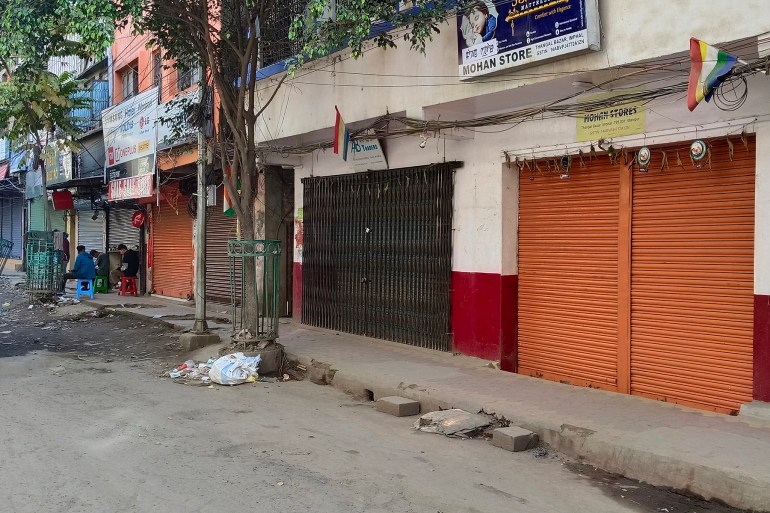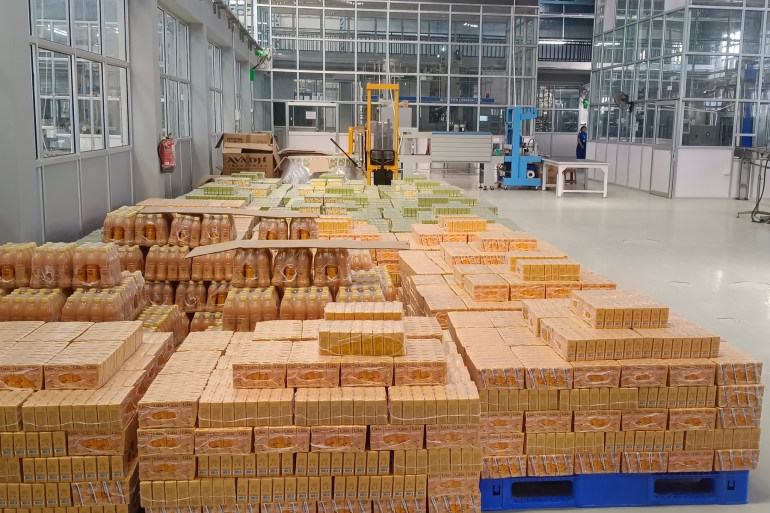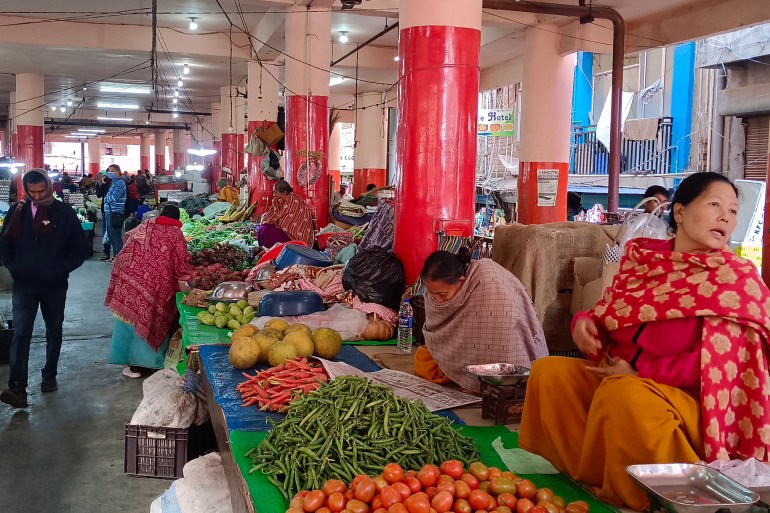Ethnic conflict in India’s Manipur has ‘completely ruined’ businesses
More than eight months of ethnic violence in Manipur has led to an unprecedented loss to the economy and business.

Kolkata, India – Helena Kshetri has seen her fruit sales wiped out since an ethnic conflict engulfed the northeast Indian state of Manipur in early May.
“We are often forced to shut shops due to curfews and shutdowns even after months of violence,” said the 50-year-old vendor, who works at Ima Keithel, or the Mother’s Market, in the state’s capital Imphal.
Keep reading
list of 4 itemsUN’s Sigrid Kaag: Is starvation an Israeli weapon in Gaza?
How a ragtag army defended Bosnia and Herzegovina against two aggressors
Russia-Ukraine war: List of key events, day 792
Her sales have crashed from 30,000-40,000 rupees ($360-$480) per day to barely 4,000 rupees ($48). “I deal in fruits and cannot hold them for long in case they rot, and I’m forced to sell even in losses. The government should bring the situation under control so that we can run our businesses,” Kshetri said.
Businesses and entrepreneurs, both small and large on both sides of the divide, are hurting on account of the violence that broke out on May 3 and has continued to engulf the state in an ethnic conflict. So far, about 180 people, including women and children have been killed, and several homes, businesses and places of worship have been torched with thousands left homeless, many of whom have fled to other states to seek refuge.
Retail inflation is through the roof at 11.63 percent and the internet has been shut down for vast periods, affecting businesses and residents.
“We are passing through a very difficult phase and the situation is even worse than insurgency, demonetisation [of currency] and COVID,” said Haorokcham Anil, the secretary of the Manipur Chamber of Commerce and Industry. “The business has been completely ruined and it’s very hard to predict when the situation would be even close to normal.”
Violence begins
Manipur is home to several communities and tribal groups including the Meitei, Nagas and Kuki. The dominant Meitei community is largely Hindu and lives in the Imphal Valley, while the Naga and Kuki tribes, who are predominantly Christians, mostly reside in the hills.
The Meiteis comprise 51 percent of Manipur’s population of 2.3 million but are concentrated in the plains, holding only 10 percent of the land. Kukis and Nagas, who comprise 40 percent of the population, occupy 90 percent of the land as they are mostly based in the hills that dominate the state’s landscape. Due to their larger numbers, Meiteis have a larger share of representation in the politics and state assembly.
While tension between the Meitei community and the Kuki tribes had been brewing for a while, it came to the forefront in the first week of May after the Manipur High Court, acting on a writ petition on April 14, directed the state government to send a recommendation to the federal government to grant tribal status to the Meiteis. The court’s order was strongly opposed by the Kukis who argued that it would further strengthen the already dominant Meitei community.
Members of a community with tribal status get reservations in government jobs and educational institutions.
On May 3, the All Tribal Students’ Union Manipur rallied across all hill districts of the state to protest the court order. The demonstrations turned violent and the next day, the violence spread to the capital Imphal with clashes breaking out between the two groups.
The situation is still tense and this journalist was held briefly by members of one of the groups for nearly two hours while conducting interviews in the state last month.

‘Forced to completely shut’
The violence has almost paralysed the state economy, leaving the business community in severe distress with no signs of recovery in the near future.
Several entrepreneurs said their businesses have been hit by more than 70 percent in losses and it has become difficult to even maintain daily expenses, forcing them to retrench their employees and adopt other cost-cutting measures.
Thangjam Joy Kumar Singh, the managing director of Likla, one of the biggest fast-moving consumer goods (FMCG) brands in the state selling fruit juices, pickles, bakery and packaged drinking water, conceded that he has been forced to lay off 200 of his 900 employees.
“Initially, I didn’t take the situation seriously and thought that things would turn normal within a week, but I was wrong. It was something that we had never witnessed before. We were forced to completely shut our factories for the first 15 days before we started producing packaged water as it was a necessary commodity,” he said.
Singh shut his bakery division for nearly three months and closed the bakery outlets in Kuki-dominated areas fearing violence.
“At present, we are operating at just 50 percent of our capacity and somehow managing to run the show,” he said.
The ethnic tension has split the two communities into separate zones. As a result, neither side can enter the other’s territory to do business or any activity for fear of being attacked or even killed.
Keisham Ranjan Singh, a Meitei who had a modular furniture showroom in the Kuki-dominated Churachandpur District about 60km (37 miles) from Imphal, rued that he had lost approximately 8 million rupees ($96,000) in the mayhem after his shop there was set on fire on May 16.
“We had Kuki workers also but they have lost their livelihood due to the turmoil,” he said.
Businesses in Imphal have not been spared.

Dinesh Kapoor, 59, a sound engineer who runs a sound system shop in the state capital has seen his sales crash as he used to get a lot of customers from the hills.
Compared with the 1 million rupees ($12,029) that Kapoor would typically make per day in the holiday season from sales of sound systems, his revenue from the shop has crashed to a mere 15,000 rupees ($180) a day.
“The months starting from November to March [are] good for business because Christmas, New Year, Holi and even Thabal Chongba, the biggest festival of the state, is held. But the violence has destroyed all. We hardly have any sales and it’s difficult to even pay the rent of the shop. The market in Imphal mostly depends on the people from the hills and their absence has affected us badly,” Singh said.
Hanjabam Shubhra Devi, 55, the founder of Meira Foods, a packaged food venture that employs mostly women, feared that loss of business might lead to domestic violence in employees’ households.
“The women… usually remain at the receiving end of the economic turmoil caused in the family due to loss of income. There are apprehensions of an increase in domestic violence in the aftermath of the present condition,” she told Al Jazeera.
Kuki businessmen too have felt the brunt of the violence.
Mang Misao, 40, runs a gas agency in Imphal. His office and home were attacked and vandalised on May 4 and about 1,200 gas cylinders and two commercial vehicles were looted.
Misao and his extended family of 20 lived in a three-storey building near his office. “We had already escaped to our neighbour’s house fearing violence and were later rescued by army personnel,” Misao told Al Jazeera.
In July, a mob burned his three trucks stationed at an LPG bottling plant on the outskirts of Imphal.
Since then, the family has been scattered, with some moving to Kuki-dominated areas and others having fled to neighbouring states for a few months.
“We had been running the agency for the past four decades and have never faced such situation before,” Misao said. “We are in dilemma as to whether to resume the business in future or not … Everything is lost.”
Tourism hit

Manipur’s tourism sector has not been spared either. According to data from the state Tourism Department, about 160,000 tourists, including 5,400 foreign nationals, visited Manipur in the financial year ending March 2023. But the numbers collapsed to just 19,908, including 1,144 foreign visitors, from April until November.
“We were witnessing one of the best times” because of a G20 meeting in February, which was followed by the Miss India pageant in April, said Kherdananda P, the deputy director of Manipur’s Department of Tourism. “Everyone was optimistic that Manipur was the next favourite destination for business and tourism after facing years of insurgency [over demands for a separate statehood]. But the violence changed the complete scenario, bringing us to ground zero.”
The hospitality industry is bearing the brunt of that. Thangjam Dhabali Singh, a veteran entrepreneur who runs a resort and three hotels including the Classic Grande in Imphal, the only four-star hotel in Manipur, said that the occupancy of the 370 rooms across all his properties has dropped to just 30 percent since the violence broke out.
“The year [2023] had started on a good note as the business was booming due to various high-profile events like G20 and we had around 70 percent of our rooms occupied. But the situation is too bad now,” he told Al Jazeera. While Singh has not laid off any of his 600 employees, their duties have been reduced to a rotational basis due to a smaller number of guests, he said, adding that the “tourism industry has witnessed the worst of the crisis”.
According to Chinglen Maisnam, an economics professor at Manipur University, the state is heading towards economic stagnation and breakdown.”We can expect a sharp fall in growth rate because of slowing investment growth and slackening consumption demand,” he added.
The government, he said, needs to assess the extent of the economic loss caused by the conflict and provide compensation and livelihood to the affected people.
A senior government official, on condition of anonymity as he is not authorised to speak to the press, said the time is not yet conducive to calculating the economic loss caused by the violence. “The situation is still volatile… It would take a detailed study across the state to find the extent of the damage but it is dangerous to enter those areas that have been severely hit by the violence.”